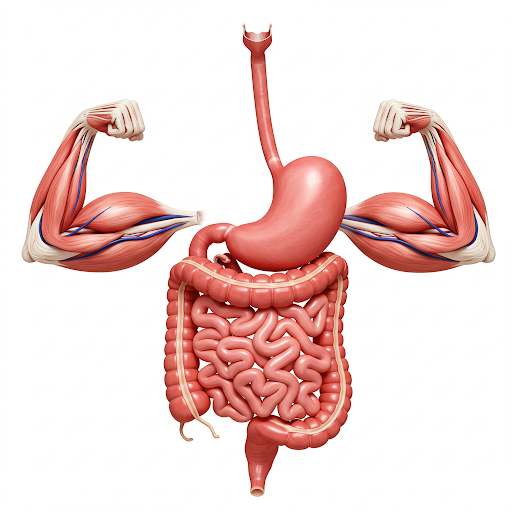Your cart is currently empty!

The Gut Biome: A Key Player in Human Health and Athletic Performance
human Gut Microbiota
The human gut microbiota, a complex community of trillions of microorganisms residing in our digestive tract, has emerged as a critical factor in human health. These microscopic inhabitants play a multifaceted role, influencing everything from digestion and immunity to even potentially impacting athletic performance and muscle mass.
The Gut Microbiota’s Impact on Health
The gut microbiota’s influence on human health is vast and varied. It aids in the digestion of complex carbohydrates, produces essential vitamins, and plays a crucial role in the development and regulation of the immune system [1]. The gut microbiota also contributes to the production of short-chain fatty acids (SCFAs), which have anti-inflammatory properties and can influence metabolism [2].
Disturbances in the gut microbiota, known as dysbiosis, have been linked to a range of health issues, including inflammatory bowel disease, obesity, type 2 diabetes, and even mental health disorders [3]. The mechanisms by which the gut microbiota exerts its influence are complex and involve interactions between the gut microbiome, the immune system, and the nervous system.

Gut Microbiota and Athletic Performance
Emerging research suggests that the gut microbiota may also play a role in athletic performance. Studies have shown that athletes tend to have a more diverse gut microbiota compared to sedentary individuals [4]. This diversity is thought to be beneficial, as it can contribute to improved nutrient absorption, enhanced immune function, and reduced inflammation – all factors that can impact athletic performance.
One specific area of interest is the gut microbiota’s potential influence on muscle mass and function. While research in this area is still in its early stages, some studies have indicated that certain gut bacteria may contribute to muscle growth and repair [5]. For example, some bacteria can produce metabolites that promote muscle protein synthesis, a key process in muscle building. However, more research is needed to fully understand the complex relationship between the gut microbiota and muscle health.
Strategies for Improving Gut Health
Given the importance of the gut microbiota for overall health and well-being, it’s essential to adopt strategies that promote a healthy gut microbiome. Here are four evidence-based approaches:
- Consume a Diverse Diet Rich in Fiber: A diet rich in fruits, vegetables, whole grains, and legumes provides a variety of prebiotics, which are non-digestible fibers that feed beneficial gut bacteria [6]. Aim for at least 25-30 grams of fiber per day and choose a wide range of plant-based foods to promote a diverse gut microbiota.
- Include Fermented Foods in Your Diet: Fermented foods like yogurt, kefir, sauerkraut, and kimchi contain live bacteria that can help to diversify and enrich the gut microbiota [7]. However, it’s important to choose products with live and active cultures and consume them regularly to reap the benefits.
- Limit Processed Foods and Sugar: Processed foods and sugary drinks can negatively impact the gut microbiota by reducing diversity and promoting the growth of harmful bacteria [8]. Limiting these foods and opting for whole, unprocessed foods can help to maintain a healthy gut microbiome.
- Manage Stress: Chronic stress can disrupt the gut microbiota and increase inflammation [9]. Practicing stress-reducing techniques such as meditation, yoga, or spending time in nature can help to support a healthy gut.
Conclusion
The gut microbiota is a fascinating and complex ecosystem that plays a vital role in human health. From digestion and immunity to potentially influencing athletic performance and muscle mass, the gut microbiota’s impact is far-reaching. By adopting evidence-based strategies to improve gut health, we can support our overall well-being and potentially enhance our athletic potential.
References
[1] Round, J. L., & Mazmanian, S. K. (2009). The gut microbiota shapes intestinal immune responses during health and disease. Nature Reviews Immunology, 9(5), 313-326.1 https://www.nature.com/articles/nri2515 [2] Morrison, K. E., & Preston, T. (2016). Formation of short-chain fatty acids by the gut microbiota. Nutrients, 8(5), 290. https://www.ncbi.nlm.nih.gov/pmc/articles/PMC4870413/ [3] Cryan, J. F., O’Riordan, K. J., Dinan, T. G., & Grenham, S. (2019). The gut microbiome as a major regulator of the gut-brain axis. Trends in Neurosciences, 42(9), 547-561. https://www.cell.com/trends/neurosciences/S0166-2236(19)30139-2/fulltext [4] Clarke, S. F., Murphy, A., O’Brien, E., O’Connor, T. P., Sloan, K. P., & Molloy, M. G. (2014). Exercise and associated dietary strategies to modulate the human gut microbiota: a systematic review. The American journal of clinical nutrition, 100(1), 209-220. https://academic.oup.com/ajcn/article/100/1/209/4562171 [5] Evans, C. E., & Hughes, M. C. (2022). The role of the gut microbiome in muscle health and function. Nutrients, 14(2), 493. https://www.mdpi.com/2072-6643/14/2/493 [6] Slavin, J. L. (2013). Fiber and prebiotics: mechanisms and health benefits. Nutrients, 5(4), 1417-1435. https://www.ncbi.nlm.nih.gov/pmc/articles/PMC3705355/ [7] Hill, D., Sugrue, E., Tobin, C., Hill, C., & Stanton, C. (2017). The role of the gastrointestinal microbiota in health and wellbeing. Irish medical journal (Dublin, Ireland: 1971), 110(4), 86. https://www.ncbi.nlm.nih.gov/pmc/articles/PMC5524452/ [8] Sonnenburg, C. D., & Sonnenburg, J. L. (2015). Diet, microbes, and the gut: the role of diet in shaping the human gut microbiome. The American journal of clinical nutrition, 102(5), 1064-1072. https://academic.oup.com/ajcn/article/102/5/1064/4555948 [9] Madison, A., & Kiecolt-Glaser, J. K. (2019). Stress, depression, diet, and the gut microbiome: human-bacteria interactions at the intersection of health and disease. Current opinion in gastroenterology, 35(6), 526. https://journals.lww.com/co-gastroenterology/Abstract/2019/11000/Stress,_depression,_diet,and_the_gut_microbiome.7.aspx